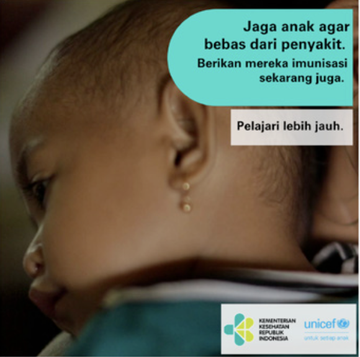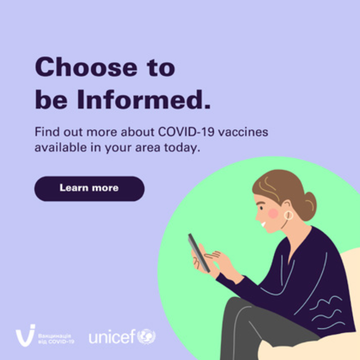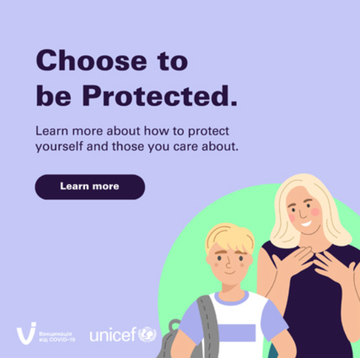Principle 5: Connect with people’s values
💡 Vaccine decisions are value-based decisions, guided by a person’s own innate morals.
Each person has different combinations of six moral foundations(1):
- Care/harm
- Authority/subversion
- Loyalty/betrayal
- Liberty/oppression
- Purity/degradation
- Fairness/cheating
Emerging research suggests that vaccine decisions may be negatively influenced by two moral values – liberty and purity – and positively influenced by deference to authority (2). Parents who were more vaccine-hesitant placed a higher emphasis on purity or liberty. As such, messaging campaigns that focus on purity and liberty in promoting vaccination among vaccine-hesitant parents may be more effective at increasing vaccination.
An example of a purity-based message could be:
“Boost your child’s natural defences against diseases! Keep your child pure of infections – vaccinate!”
Good practice: Emphasising purity
UNICEF Indonesia

[ENG] Keep your child pure of disease. Vaccinate today! Learn more.
For UNICEF Indonesia, an image of an infant is paired with a message framing vaccination as a way for parents and caregivers to keep children pure of disease and safe from harm. This campaign was developed in direct response to online public comments expressing a preference for natural immunity.
An example of a liberty-based vaccine message could be:
“Take personal control of your child’s health! Vaccinations can help your child and others be free to live a happy and healthy life.”
UNICEF Ukraine
In Ukraine, illustrations featuring different characters were paired with a message that highlighted the personal choice of COVID-19 vaccination, emphasising the liberty value.


Insights from social listening analysis revealed a lack of trust in the publicly-available vaccines and feelings that people should respect others’ personal choices on COVID-19 vaccines, rather than mandates. These messages used the liberty value to frame COVID-19 vaccination as an individual choice.
These messages were effective in positively shifting attitudes on the benefits of vaccines over the risk of the disease.
Sources:
(1) Graham, J. et al. Mapping the moral domain. J. Pers. Soc. Psychol. 101, 366–385 (2011). & Haidt, J. & Graham, J. When morality opposes justice: conservatives have moral intuitions that liberals may not recognize. Soc. Justice Res. 20, 98–116 (2007).
(2) Amin, A.B., Bednarczyk, R.A., Ray, C.E. et al. Association of moral values with vaccine hesitancy. Nat Hum Behav 1, 873–880 (2017). https://doi. org/10.1038/s41562-017-0256-5 & Rossen I, Hurlstone MJ, Dunlop PD, Lawrence C. Accepters, fence sitters, or rejecters: Moral profiles of vaccination attitudes. Soc Sci Med. 2019;224:23-27.
Average Rating: ☆ ☆ ☆ ☆ ☆ (0 reviews)


